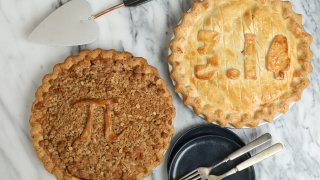
Math is all around us: the music you listen to, the vehicles you drive and even the food you bake can all be represented mathematically. But for most kids - and many adults - the word math evokes unpleasant thoughts of stress-inducing tests. Is there a way to help kids let go of their negative associations and learn to love mathematics?
Pi Day, celebrated every year on March 14, is an excellent opportunity to teach kids that math can be more than just a confusing homework assignment. Thanks to the similarity between the spelling of pi and pie, and the fact that most pies are circular, Pi Day celebrations often include baking. With its emphasis on precise measurements, it is the perfect way to show kids how math works in the real world. Rather appropriately, it all comes full circle.
This March 14, try engaging kids with math through a Pi Day bake-off at home, at school or in a club for a great way to get kids thinking a little differently about math. Unlike infinitely repeating pi, you can predict where the day will end up: with a fresh-baked, delicious treat for everyone to enjoy.
The Importance of Pi Day
We're making it easier for you to find stories that matter with our new newsletter — The 4Front. Sign up here and get news that is important for you to your inbox.
According to San Francisco's Exploratorium, Pi Day was created in 1988, almost 4,000 years after the mathematical constant now known as pi, often written as π, was discovered. This day celebrates the concept of pi, which is usually defined as the ratio between the circumference and diameter of a circle.
An Exploratorium employee, Larry Shaw - described on their website as "staff physicist, tinkerer, and media specialist" - came up with the idea of celebrating pi on March 14. Since the first three figures of Pi are 3.14, it seemed only fitting to designate the fourteenth day of the third month of the year for this special occasion. Later, Shaw's daughter Sara realized that Pi Day held further significance to the scientific community: March 14, 1879, was the date that renowned physicist Albert Einstein was born.
Today, Pi Day is an official US holiday that is also celebrated worldwide. Pi Day festivities include pi processions, pi memorization competitions and, ever since the very first Pi Day, baking and enjoying pie.
U.S. & World
The day's top national and international news.
The educational twist: Baking meets mathematics
You've likely heard people say that baking is a science, but did you ever stop to think about what that really means? Baking rewards precision, whether you're buying groceries, weighing flour, measuring fractions of cups or using geometry to divvy up dessert between squabbling siblings. Thanks to the inherent connections between math and baking, a baking competition is a great way to challenge kids to apply their math skills in a new context.
Of course, Pi Day doesn't have to be limited to sweet treats. Pizza , arepas con queso and scallion pancakes are just some of the savory dishes that you can enjoy on Pi Day. Their round shape makes them perfect for dividing up into fractions: a great learning opportunity.
Success stories
Just as a delectable pie requires many different ingredients, there are many different factors that contribute to kids' math skills. But parents have an important role to play in helping their children succeed, according to a recent interview with Dr. Steve Murphy of the School of Education, La Trobe University, Australia, published on Science X.
Dr. Murphy's research found that many parents, who may not be used to modern math teaching methods, did not feel confident supporting their children with their studies. But Dr. Murphy stresses that you don't need to be Sir Isaac Newton to help your kids succeed in math. According to Dr. Murphy, "Parents don't need to teach math; they just need to support what their child's teacher is doing. Keeping positive, being encouraging and interested in their children's math learning goes a long way."
Encouraging playful math engagement
Developing a playful approach to math can complement traditional academic studies, helping kids stay engaged and confident. For example, research recently presented at a conference hosted by the International Society of the Learning Sciences emphasized the importance of adopting a playful approach to math.
Dr. Christine Lee of UCLA, Megan Wongkamalasai of the University of Georgia, Dr. Naomi Thompson of Indiana University and Lara Jasien of CPM Educational Program each presented studies that provided guidance on "designing playful environments where children enjoy and participate in mathematics." The researchers seemingly aimed to combat the "void of agency and enjoyment" that is often perceived in mathematics classrooms, thus building students' self-confidence.
For example, Dr. Thompson's research invited children to implicitly explore mathematical concepts through weaving activities without explicitly teaching math lessons. This "playful and experimental approach to mathematics" made it possible for her students to explore math curriculum concepts, solve problems and imagine new possibilities.
Organizing a Pi Day Bake-Off at School or a Club
If you'd like to organize a Pi Day event, don't let your plans become a pie in the sky. A large-scale Pi Day may require some advance planning, while your class or club may find it easier to celebrate Pi Day on shorter notice. Here are some questions to ask yourself as you prepare for the big day:
How old are the kids who will be participating? Depending on the children's ages, you may want to call upon additional staff for backup.
Would local businesses be interested in providing support? Local pizzerias and bakeries may be willing to loan equipment to make your Pi Day bake-off a success. They may even be able to provide supplies or food at discounted rates.
What recipes would work best in my club or classroom? Apple pie, which requires cutting and peeling apples, may pose a safety hazard to younger children. Instead, think about choosing a kid-friendly recipe, such as a no-bake cheesecake or lemon cake pops from a boxed cake mix that kids can decorate with pi symbols.
How competitive should this event be? You may want to assign judges or hold a vote through a secret ballot. Alternatively, you can play down the competitive aspect to avoid any hurt feelings.
How can I make this event a learning experience? You might take inspiration from Welchester Elementary School in Golden, Colorado. The school hosts a pie-making event for its 5th graders that challenges students to add, subtract, divide and multiply fractions.
Organizing a Pi Day bake-off at home
Celebrating Pi Day at home is a great way to build upon the skills that your children are learning in math class. It can be as simple as making a beloved recipe together and inviting kids to notice any links to math. Or you can challenge kids to calculate and convert the ingredient measurements needed to bake a pie.
By choosing your recipe carefully, you can show kids that math has practical applications. For example, this cinnamon roll apple pie recipe requires kids to use their math skills to figure out how to cut up a cinnamon roll cylinder into enough pieces to create a pie crust.
Encouraging a love of math
Sometimes, kids feel frustrated because it seems like the math they learn in the classroom has no connection to the real world. Baking together is a gentle and fun reminder that math can be helpful, not stressful. Whether you lean into the math connections or leave them for kids to discover independently, Pi Day is a great way to help kids develop a creative, playful approach to math.
And who knows? You might also learn something new about math along the way.
Mandy Applegate is the enthusiastic creator of the vegetarian websiteSplash of Taste; she makes meat-free cooking fun and easy. When Mandy's not cooking and writing, you'll find her traveling, exploring countries and cuisines, and spending time with her chihuahua.



